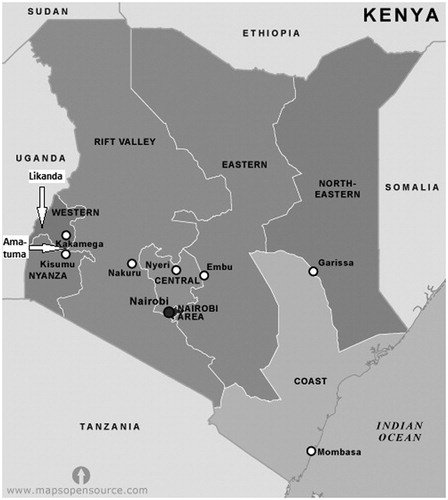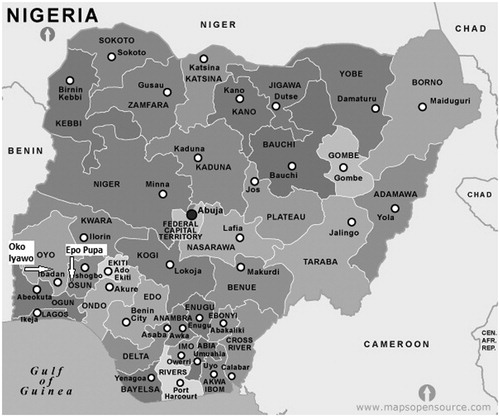Figures & data
Table 1. Sampled villages.
Figure 1. Study villages in Kenya. Source: http://mapsopensource.com/kenya-map-black-and-white.html accessed 5 June 2017. Map licensed under a Creative Commons Attribution 3.0 Unported License (see https://creativecommons.org/licenses/by/3.0/deed.en_US); labels are ours.

Figure 2. Study villages in Nigeria. Source: http://mapsopensource.com/nigeria-map-black-and-white.html accessed 5 June 2017. Map licensed under a Creative Commons Attribution 3.0 Unported License (see https://creativecommons.org/licenses/by/3.0/deed.en_US); labels are ours.

Table 2. Village overview.
Data sharing statement
We cannot by e.g. Swedish law, the CGIAR’s GENNOVATE data sharing agreement, and privacy and ethics in research considerations to protect security, anonymity and privacy of individuals participating in a study, publish or share data including personal information without anonymizing it first. Our raw interview data contain sensitive personal data. For that reason we will e.g. consider a voice recording as personal data in its entirety. Publication of transcribed raw interview data needs extensive anonymization due to the following: Information collected contains personal data from individuals participating in the study; Participants in the study were informed that their participation was going to be kept confidential; Specific sensitive topics were discussed during the interviews (such as violence and other conducts or customs in communities that are legally prohibited, as well as socially, politically and beliefs-related sensitive information); Participants revealed considerable specific details of their private life as well as practices by others in their communities. Making the information available will: (i) violate the permission given by the participants to collect their data, obtained in accordance to the study protocol; (ii) expose the security of the participants that revealed the referred information; and (iii) violate the privacy of the individuals that participated in the study, as well as those that did not participate but were included in the data, descriptions and stories provided by the participants. Anonymizing the data to the extent this would require and then only partially publishing/sharing the data that could be anonymized will create a misleading data set. Hence our raw interview data will not be published nor made accessible.
